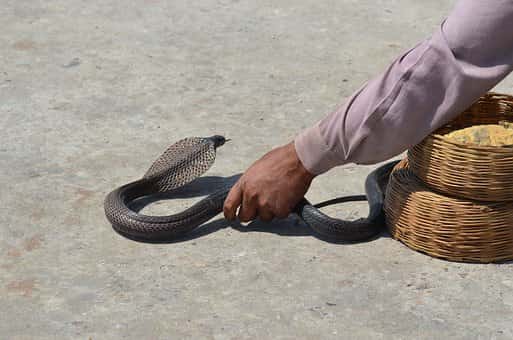What are snake bites?
Treatment for Poisonous Snake bites & First Aid.
Snakes are located mostly all over the world and snake bites are more
common in tropical and subtropical region.
In India, snake bite cases primarily found in rural and agricultural area.
According to wikipedia, there are almost 600 venomous snakes in the world and around 300 species of snakes native to India but a few are deadly.
Some poisonous snake types are stated below in this article that may deliver an array of symptoms like swelling and pain at bitten site, nausea, vomiting, allergic reaction, convulsion, breathing problems, local necrosis, paralysis, trouble seeing, fever, and even shock.
It is very difficult task to determining whether or not poisonous snake bite.
In India, snake bite cases primarily found in rural and agricultural area.
According to wikipedia, there are almost 600 venomous snakes in the world and around 300 species of snakes native to India but a few are deadly.
Some poisonous snake types are stated below in this article that may deliver an array of symptoms like swelling and pain at bitten site, nausea, vomiting, allergic reaction, convulsion, breathing problems, local necrosis, paralysis, trouble seeing, fever, and even shock.
It is very difficult task to determining whether or not poisonous snake bite.
Types of Poisonous snakes and their family
Cobra, King cobra, Krait / Bungarus caeruleus, Indian cobra / Naja naja,
etc. (Elapidae family)
Vipers, Russells viper/Daboia russelii, Saw-scaled viper / Echis carinatus
etc. (Viperidae family).
Sea snakes (Hydrophidae family).
Venomous, Dangerous, and Deadliest Snake of India
The most dangerous Indian snakes that are capable of killing a human being
with their bite as following -
1.Indian Krait / Common krait / Blue krait - Scientific name - Bungarus
caeruleus.
2.Indian python / Asian rock python / Black-tailed python / Indian Rock
Python/ Ajgar - Scientific name - Python molurus.
3.Russell’s Viper / Chain viper/Chain snake / Scissors snake / Seven pacer - Scientific name - Daboia russelii.
4.Saw Scaled Viper / Carpet vipers
-Scientific name - Echis carinatus.
5.Indian Cobra / Spectacled Cobra / Naja naja -Scientific name - Coluber Naja.
6.King Cobra / Hamadryad - Scientific name - Ophiophagus hannah.
7.Malabar Pit Viper / Malabarian Pit Viper - Scientific name - Trimeresurus malabaricus.
8.Hump Nosed Pit Viper / Merrem's hump-nosed viper - Scientific name - Hypnale hypnale.
9.Bamboo Pit Viper / Indian tree viper / Green tree viper - Scientific name - Trimeresurus gramineus.
10.Andaman Pit Viper - Scientific name - Trimeresurus andersonii.
11.Banded Krait - Scientific name - Bungarus fasciatus.
12.Banded Sea Krait / yellow-lipped sea krait - Scientific
name - Laticauda colubrina.
Diagnostic investigations in the case of Snake-bites.
Blood tests -
Blood clotting test/Prothrombin time, Haemoglobin level test, Serum creatinine test, Serum amylase test, CPK test (creatinine phosphokinase), electrolytes assessment, FDP (fibrin degradation products) test, Fibrinogen test etc.
Blood clotting test/Prothrombin time, Haemoglobin level test, Serum creatinine test, Serum amylase test, CPK test (creatinine phosphokinase), electrolytes assessment, FDP (fibrin degradation products) test, Fibrinogen test etc.
Urine test
Urine routine examination for haematuria, haemoglobinuria, globinurea, albuminuria, myoglobinuria etc.
Urine routine examination for haematuria, haemoglobinuria, globinurea, albuminuria, myoglobinuria etc.
ECG (Electrocardiogram).
EEG (Electroencephalogram).
ELISA (Enzyme linked immunosorbent assay) test.
Prognosis & Outlook for a snake bite
Outcomes depends on the age, size, health and psychological conditions of the person as
children and elderly victims run the risk of death.
Prognosis or outlook for an individual with a venomous snake bite is can be very difficult. It always depends upon quick first aid treatment and emergency care including antidote treatment.
If snake bitten person receives an emergency treatment with antidote too earlier, the outcomes can be predicted as good.
In the case of venomous snake bite, an immunity strength has a great value for prediction because a person with poor immune system bitten by venomous snake may be fatal.
Apart from this, the outlook will be good, if victim is bitten by non-venomous snake. It requires only prompt cleanliness of the wound with antiseptic soap and other symptomatic managements as well.
Prognosis or outlook for an individual with a venomous snake bite is can be very difficult. It always depends upon quick first aid treatment and emergency care including antidote treatment.
If snake bitten person receives an emergency treatment with antidote too earlier, the outcomes can be predicted as good.
In the case of venomous snake bite, an immunity strength has a great value for prediction because a person with poor immune system bitten by venomous snake may be fatal.
Apart from this, the outlook will be good, if victim is bitten by non-venomous snake. It requires only prompt cleanliness of the wound with antiseptic soap and other symptomatic managements as well.
Snakebite Signs and Symptoms
Two fang marks that look like needle puncture.
Drooping eyelids.
Paralysis.
Bleeding arround the wound.
Change in skin color - cold and clammy skin.
Overwhelming fear and emotional instability.
Blurred Vision - Difficulty seeing.
Difficulty breathing, speaking and
swallowing.
Hypotension - Low Blood pressure.
Allergic reactions.
Increased salivation.
Burning or tingling sensation in the limbs.
Tiredness.
Redness at the bite site - Severe localized pain / tender and swelling.
Convulsion, fainting / drowsy.
Fever, Thirst, and Excessive Sweating/Increased perspiration.
Rhabdomyolysis - Loss of Muscle Coordination/distant muscle involvement.
Numbness and Muscular Weakness.
Rapid Pulse / heart beat (tachycardia).
Necrosis - Tissue death.
Shock or even death due to bleeding.
First Aid Treatment & Management for snake bites
The purpose of first aid treatment is to limit the systemic absorption of
venom with the help of ligation just above bitten area to block lymphatic flow,
pressure bandaging for immobilization purpose.
Always remember that quick first aid treatment may be life saving.
Here are some guidelines for first aid treatment while awaiting the emergency services and that are next -
Always remember that quick first aid treatment may be life saving.
Here are some guidelines for first aid treatment while awaiting the emergency services and that are next -
Always keep in your mind that most species of the snake are non-poisonous,
so most snake bites can't be fatal. So, do not be restless and stay calm.
Call medical assistance to the patient for emergency medical care as soon
as possible.
Antivenom serum can be life saving because it counteracts against venomous effects.
Antivenom serum can be life saving because it counteracts against venomous effects.
Keep the person as warm as possible.
Constrictive ornaments like rings, bangles, bracelets, watch or other
jewelery and tight-fitting garments of the victim should be removed
immediately because such kind of articles can cut off blood circulation in
case of inflammation of bitten limb.
Restrict the movement of the affected limb is necessary because it can help
delay absorption of the venom.
For this purpose, use crepe bandage, sling, or splint to reduce movement.
For this purpose, use crepe bandage, sling, or splint to reduce movement.
A tight band should be applied just above (at least 5 inches away) from the
fangs puncture.
For ligation purpose, never use a tourniquet.
For ligation purpose, never use a tourniquet.
Try not to catch or handle the snake. If possible, kill the snake and try
to identify the species of the snake as soon as possible because it help in
determination of antivenin selection and administration.
Always monitor the vital functions of the victim too closely to find out
any signs of shock.
Do not cut or make an old dated cross mark over bitten region as well as stay away from poison sucking out by mouth from the bitten site.
One can use suction pump without cutting.
One can use suction pump without cutting.
Do not wash the bitten area.
Do not give pain killers or other medicines without recommendation of a
doctor.
Try not to use a cold compress with ice-cubes on the bite site.
Make a marking sign over crepe or other pressure bandage with pen or marker
because it can give a valuable information to the doctor and also note the time
of the bite.
Giving the acoholic beverages like whisky, beer, rum etc., caffeinated
drinks like tea or coffee or any kind of medicines to the victim may be
dangerous.
There are two types of antidote (Antivenoms) for snake venom accessible in
the market and that are next -
1. Monovalent -
It is single species' specific antivenom that works against a particular type of snake bite.
It is single species' specific antivenom that works against a particular type of snake bite.
Antisnake venom serum (Trade name - ASVS injection)
2. Polyvalent -
It may be effective against several species of snake bites including cobra, common krait, russels viper, and saw scaled viper.
It may be effective against several species of snake bites including cobra, common krait, russels viper, and saw scaled viper.
* Polyvalent Antisnake venom serum (Trade name - SiiASVS injection)
This serum neutralizes standard venoms of cobra, common krait,
russels viper, saw scaled viper.
* Lyophilised Polyvalent Antisnake venom serum / Enzyme refined -
Purified globulin of reconstituted serum neutralises of dried cobra venom,
common krait venom, russels viper venom, sawscaled viper / echis carinatus venom.
* VINSASVS (Trade name)
A reconstituted antiserum shall neutralize of Indian cobra venom, common
krait venom, russels viper venom, sawscaled viper venom.
Side effects -
Allergic reactions, itching, joint pain, serum sickness, fever,swelling of lymph nodes, fatigue, tiredness, and anaphylactic
sock.
REFERENCES
.................................................














No comments:
Post a Comment